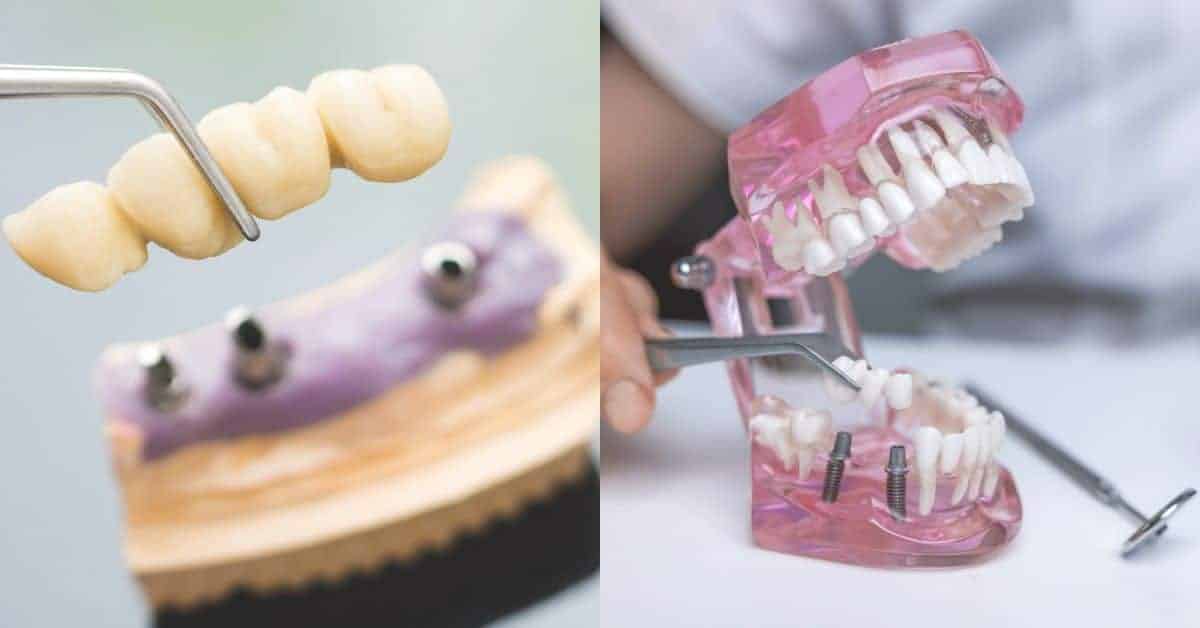A dental bridge is a fixed prosthetic device used to replace one or more missing teeth by anchoring artificial teeth (pontics) to adjacent natural teeth or dental implants. It is available in various materials, including porcelain-fused-to-metal (PFM), all-ceramic, and zirconia.
Dental bridge costs range from RM800 to RM3,000 per unit, depending on the type of bridge, materials used, procedure complexity, and clinic location. Traditional PFM bridges cost between RM800 and RM1,500 per unit, all-ceramic bridges range from RM1,500 to RM2,500 per unit, and premium zirconia bridges range from RM2,000 to RM3,000 per unit. The total treatment costs typically include the initial consultation, X-rays, tooth preparation, temporary bridge placement, final fitting, and follow-up appointments.
Dental Bridge Price in Malaysia
What Is The Average Cost of Dental Bridges in Malaysia?
The cost of dental bridges in Malaysia ranges from RM800 to RM3,000 per unit. Traditional porcelain-fused-to-metal (PFM) bridges are the most economical option, generally costing between RM800 and RM1,500 per unit. Higher-end options like all-ceramic or zirconia bridges command premium prices ranging from RM1,800 to RM3,000 per unit.
These prices include preparing adjacent teeth, placing temporary bridges during fabrication, and installing the final bridge. The investment typically covers a dental solution that, with proper care, can last 10-15 years or more.
What Types of Dental Bridges Are Available, and What Are Their Costs?
Traditional bridges using porcelain-fused-to-metal (PFM) remain the most common choice, priced between RM800 and RM1,500 per unit. They offer a balance of durability and affordability. All ceramic bridges, priced from RM1,500 to RM2,500 per unit, provide superior aesthetics and are ideal for visible front teeth.
Premium zirconia bridges, ranging from RM2,000 to RM3,000 per unit, offer exceptional strength and natural appearance. Maryland bridges, a conservative option using metal or porcelain wings rather than crowns, cost between RM1,000 and RM2,000 per unit. Cantilever bridges, suitable for specific cases where traditional bridges aren’t feasible, range from RM1,200 to RM2,500 per unit. Each type comes with its own set of advantages and considerations regarding longevity, appearance, and functionality.
What Additional Services Should Be Included?
A comprehensive dental bridge treatment package in Malaysia should encompass various essential services and considerations. The initial phase should include detailed consultations, diagnostic imaging, panoramic X-rays and 3D scans, and treatment planning. Patients should receive temporary prosthetics, bite adjustments, and aesthetic consultations during treatment.
If needed, post-treatment care should include follow-up appointments, oral hygiene instructions, maintenance guidelines, and emergency support. Many clinics offer extended warranty programs, payment plans, and ongoing maintenance packages. Advanced clinics might provide digital smile design services, computer-aided design and manufacturing (CAD/CAM) technology for same-day bridges, and specialized solutions for complex cases.
Special Considerations and Additional Treatments
Dental bridge treatment requires complementary procedures for optimal results. These may include periodontal treatment, root canal therapy, bone grafting for proper support, gum contouring for aesthetic improvement, and bite analysis for appropriate alignment. Some patients might need orthodontic adjustment before bridge placement.
Post-treatment considerations include night guards to protect the bridges, special cleaning tools, and regular professional maintenance. Many clinics offer specialized services for anxious patients, including sedation options and comfort amenities. Advanced digital planning tools allow patients to preview their expected results before treatment begins.
Patient Care and Support Services
Leading dental clinics in Malaysia provide comprehensive support services to ensure successful bridge treatment outcomes. These include detailed pre-treatment consultations, personalized treatment planning, financing options, and insurance processing assistance. Patients also receive extensive education about bridge maintenance, dietary recommendations, and oral hygiene practices.
Many clinics offer emergency support services, regular check-up programs, and warranty protection. Support services might also include transportation assistance for international patients, language interpretation services, and coordination with other medical providers when needed.
Long-term Maintenance and Future Considerations
Proper maintenance can significantly extend the lifespan of dental bridges. Malaysian dental clinics typically offer comprehensive aftercare programs, including regular professional cleaning, periodic evaluations, and maintenance advice. Long-term considerations should include the potential need for replacement or repairs, the impact on surrounding teeth, and ongoing oral health management.
Clinics often provide specialized cleaning tools, custom maintenance products, and regular assessment schedules. Advanced imaging technology allows monitoring of bridge conditions and early detection of potential issues. Some clinics offer membership programs that include regular maintenance visits and priority access to care when needed.
Will companies or employers in Malaysia cover the cost of dental bridges?
No, dental bridge procedures have limited coverage under employer medical benefits. For government servants (pekerja kerajaan), the Medical Benefits Scheme usually provides only basic dental care coverage, with dental bridges often classified as prosthodontic treatments that may not be fully covered, especially if considered partially cosmetic.
For private sector employees (pekerja swasta), most standard company insurance policies either exclude dental bridge procedures or offer minimal coverage, as they are often categorized as major dental work rather than primary dental care. While some premium corporate insurance packages might provide partial coverage, employees generally need to pay a significant portion or the entire cost out-of-pocket. It’s advisable to check your specific insurance policy details, as coverage can vary significantly between employers.

